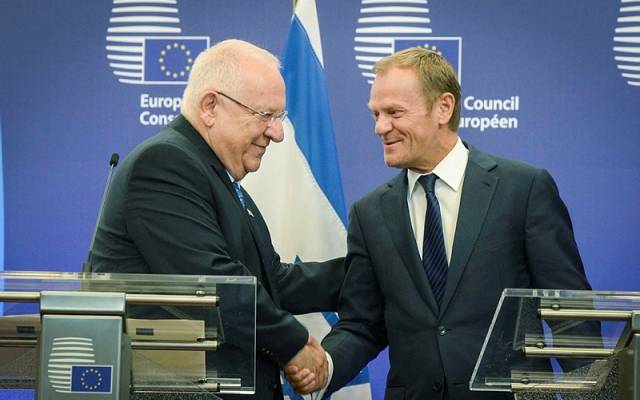In a move some say hints of Europe’s colonialist past, the EU decided to ignore issues that are far more important to Europe and the world, such as the Syrian civil war, and challenges that Europe itself is facing, including Brexit, immigration and Islamic terror, and instead wants to deflect the public’s attention and pressure Israel into making dangerous concessions to the Palestinians.
The European Union (EU) currently faces many crucial challenges, including Islamic terror striking at its capitals, a failing economy, the influx of millions of migrants from the Middle East and the possible exit of the United Kingdom from the Union, and yet it still believes one of its main focal points should be pressuring Israel into a dangerous diplomatic process with the Palestinians.
The EU’s president said it stands ready to provide Israel and the Palestinians with massive political, economic and security support as part of any peace agreement between them.
European Council President Donald Tusk said on Tuesday that the EU will “back up a peace deal with an unprecedented package of cooperation and support to both Israel and the future state of Palestine.”
Tusk said after talks in Brussels with President Reuven Rivlin that “a lasting peace in the region remains a top priority” for the EU.
Rivlin said that “promoting peace in the Middle East is a vital interest of Israel. At the same time, I believe that our special bi-lateral relations can grow and develop in an independent way.”
EU foreign ministers expressed determination on Monday to throw the bloc’s weight behind the French peace initiative, which Israel strongly opposes, and a possible international conference before the end of the year.
They invited EU agencies to present proposals “including on economic incentives, without delay.”
The French initiative entails indirect negotiations between Israel and the Palestinians with international arbitration and an international resolution to pressure Israel into concessions that could hinder its security.
The Times of Israel quoted Israeli Foreign Ministry spokesperson Emmanuel Nahshon, who said, “They have no credibility whatsoever if they deal with this conflict without dealing with the major issues that are far more important to Europe and the world, starting with the Syrian civil war, and challenges that Europe itself is facing, such as Brexit, immigration and Islamic terror.”
“Unfortunately, the conclusion is that this is probably the case,” he said.Nahshon expressed frustration, saying, Jerusalem wonders “whether Israel is not being employed, whether we are not being used in a cynical and deliberate way as a kind of fig leaf, a universal panacea, for a continent that is obviously unwilling or unable to deal with its real issues.”
Brussels faced yet another Islamic terror scare and heightened security alert during Rivlin’s visit.
Later Tuesday, Rivlin visited the headquarters of the NATO defense alliance for talks with Secretary-General Jens Stoltenberg. The visit follows a May decision by NATO’s 28 member nations to allow Israel to open a mission to the alliance.
Violent Islamic terrorism is considered one of the main security threats to NATO countries and their partners, and Stoltenberg said the alliance and Israel have begun discussions on how to better cooperate. For more than 20 years, the Jewish state has been an active participant in the Mediterranean Dialogue, a security forum that brings it, NATO and Arab countries together.
“It is vital that countries that share the same values of democracy, human rights and the rule of law stand united against hate and terrorism, and that we stand as one in defense of our open societies,” Stoltenberg said following the talks.
“Today the whole free world faces the threat of extremism, of hatred and of terrorism and violence,” said Rivlin. “It makes our close cooperation not just important but essential.”
By: AP and United with Israel Staff
